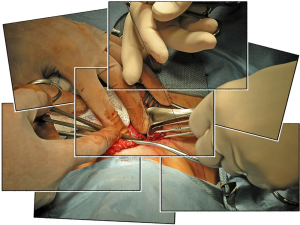Notably, treatment of thyroid cancer depends on the stage that the cancer is in as well as the histology of the biopsy sample. Particularly, surgery, radiation, suppression therapy and chemotherapy are the tools the physician will use.
Surgery
Certainly, like with many other cancers the physician will likely suggest that the thyroid cancer should be surgically removed.
In order to remove all of the cancer cells, if possible, surgery is the best approach. If this is not possible, then we want as much removed as possible. Indeed, there might be an exception as with regard to the radiation induced papillary thyroid cancer. This thyroid cancer usually has a benign course. That is to say that cancer survival is not better with surgery as it is without surgery.
Radiation
In the case, for instance, of radiation induced thyroid cancer the doctor might recommend a radiotherapy treatment by intravenous radioactive Iodine in a therapeutic dose. Later this would be followed by thyroid suppression therapy, which will suppress TSH production in the pituitary gland and thereby will take away the tumor causing effect of TSH.
Thyroid suppression therapy
This is done by finding a maintenance dose of thyroxin (Synthroid, Eltroxin etc.), which has to be taken for the rest of the patient’s life. In the regular thyroid cancer treated by surgery, this lifelong TSH suppression therapy with thyroid hormone will also have to be done to improve long-term survival.
Chemotherapy
This is used for the tumors that do not respond to conventional means (surgery, radiotherapy, TSH suppression therapy). However, the results with cisplatin, bleomycin and doxorubicin and melphalan are not encouraging.
A good response rate would be, if 20 to 30% of people treated show improvement. Unfortunately, these patients who would be in need of chemotherapy are the ones who likely have already developed resistant cancer cell clones and would be much more difficult to treat successfully than the ones who responded to the other measures mentioned above. It is up to the oncologist at the Cancer Treatment Center what combination to choose for the thyroid cancer. This judgement takes a lot of experience, literature knowledge and being in touch with the latest developments in the particular type of cancer that is being treated. Most of all the oncologist can only do the best work, if the patient seeks his/her advice early.
There is no substitute for early diagnosis and treatment.
References
1. Cancer: Principles&Practice of Oncology. 5th edition, volume 1. Edited by Vincent T. DeVita, Jr. et al. Lippincott-Raven Publ., Philadelphia,PA, 1997. Thyroid tumors.
2. Cancer: Principles &Practice of Oncology, 4th edition, by V.T. De Vita,Jr.,et. al J.B. LippincottCo.,Philadelphia, 1993.Thyroid tumors.
3. CC Cheung et al. J Clin Endocrinol Metab 2001 May;86(5):2187-2190.
4. F Dede et al. Clin Nucl Med 2001 May;26(5):396-399.
5. S Hermann et al. Int J Cancer 2001 Jun 15;92(6):805-811.
6. I Sturm et al. J Clin Oncol 1999 May;17(5):1364-1374.
7. VL Greenberg et al. Thyroid 2001 Apr;11(4):315-325.
8. K Ohta et al. J Clin Endocrinol Metab 2001May;86(5):2170-2177.
9. Conn’s Current Therapy 2004, 56th ed., Copyright © 2004 Elsevier
10. Ferri: Ferri’s Clinical Advisor: Instant Diagnosis and Treatment, 2004 ed., Copyright © 2004 Mosby, Inc
11. Suzanne Somers: “Breakthrough” Eight Steps to Wellness– Life-altering Secrets from Today’s Cutting-edge Doctors”, Crown Publishers, 2008







